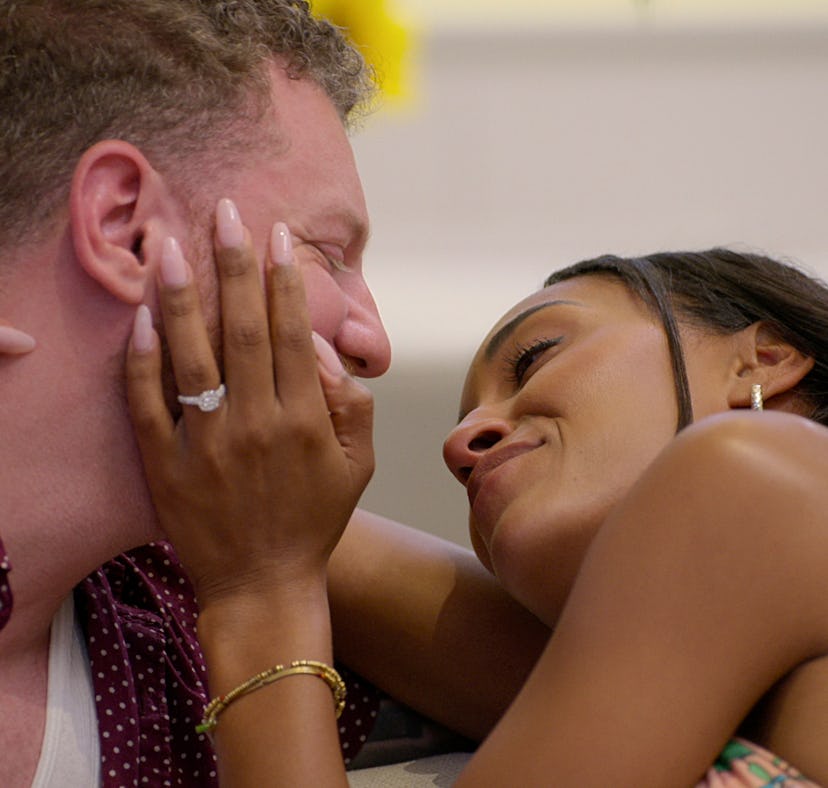
Love Is Blind Has A Problem: The Personality Catfish
Monica and Stephen’s breakup illustrates a key issue with the show’s format.
Anyone who has ever dated, well... anyone knows there’s a difference between who a person says they are and who that person actually is. Usually, it takes some time to suss that out. But on a show like Love Is Blind, where contestants have only a few days to commit to an engagement, you’ve got to get down to the real stuff fast. Seven seasons in, it’s becoming clear the series has a glaring issue: It’s plagued by the personality catfish.
Personality catfish (noun) — a person who focuses on their most positive attributes while dating, leaving behind an impression that’s more flattering than accurate.
These dishonest daters are dooming their relationships from the start. In the real world, they might be pretty easy to spot: Someone on Bumble says they’re looking for a long-term relationship, then they ghost you. Your first date says they value kindness and honesty, but they’re rude to the waitstaff.
But removing IRL interactions means Love Is Blind daters have nothing to go on but words — and that’s a recipe for disaster. “We make judgments about our connection with someone based on how they treat us and how they act in the world,” Joshua Klapow, Ph.D., clinical psychologist and behavioral scientist, tells Elite Daily. “The setup of the show prevents contestants from seeing their potential partner in action in their natural environments.”
Despite the challenges that come with its unusual premise, Love Is Blind does have its fair share of success stories. And yet Season 7 seems to be primarily defined by personality catfish moments. Ramses Prashad emphasized his progressive outlook only to be stumped by Marissa George’s birth control decision; Tyler Francis excitedly discussed becoming a dad without divulging that he was a sperm donor; Nick Dorka said he was ready to contribute as a husband but had to ask how to boil water to make pasta.
Most of these couples’ relationships have already come crumbling down, but no personality catfish was more egregious than Stephen Richardson. After proposing to Monica Davis in the pods, Stephen showed a different side of himself post-engagement — and it ultimately led to a breakup and him claiming he should never have done the show.
Monica Fell For Stephen’s Self-Analysis
Monica and Stephen had an extremely communicative relationship in the pods. He shared plenty of his hard-earned wisdom, divulging how he had grown after seeking therapy when he emotionally cheated on an ex. Plus, he gave her a play-by-play of learning he had some West African ancestry.
In both stories, Stephen placed a lot of emphasis on his personal growth, something Monica held onto throughout their courtship. When she accepted his proposal, she told him, “You’re the kindest, nerdiest, chattiest, most loving, compassionate, caring, and sweetest man.” But at that point, they still hadn’t met in person. Her character assessment of Stephen was based entirely on his own selective descriptions, not anything she’d noticed herself.
When they met IRL, Monica started to notice that his actions and words weren’t lining up. In the pods, Stephen talked about buying her flowers — something he didn’t do until she reminded him of that promise. (And even then, he told her that he considered flowers to be more of a “concept” than actual bouquets.)
Later, when Monica found Stephen’s “kinky” texts to another woman in Episode 8, it became clear to her that his perception and presentation of himself wasn’t wholly accurate — a classic case of the personality catfish. “Everything that is shared is filtered through how each contestant sees themselves,” Klapow says.
Actions Speak Louder Than Words — But On Love Is Blind, That Can’t Happen
Judging someone based on what they say about themselves rather than what they show you about themselves is never a good idea — but it’s a particularly dangerous habit when it comes to choosing your spouse. “This is about life partner evaluation,” Klapow says. “The stakes are tremendously high.”
Even with the best of intentions, it can be easy for Love Is Blind contestants to paint themselves in a more flattering light. “People want to present themselves in a favorable manner,” Klapow says. “Some will exaggerate without knowing it. Some will go as far as lying because it’s only words.”
True, people can do this in any dating situation. But the format of the show worsens the problem since the pods make it impossible for the contestants to fact-check each other. It’s only after they get engaged that they can evaluate if their partner’s words match their behavior.
This becomes all too clear as the season continues. Ramses’ self-proclaimed progressiveness gets overshadowed by his expressed concerns about having to wear a condom; Tyler’s sperm donor status becomes a real strain for him and Ashley Adionser; Nick’s uncertainty in the kitchen is a point of frustration for Hannah Jiles.
“A couple can only develop a true lasting relationship with words, dialogue, communication, and actions to corroborate what is said,” Klapow says. “Trust and love grow with both actions and words.”
Moving forward, perhaps hosts Nick and Vanessa Lachey should shift the focus to answering a new question: not “Is love blind?” but “Do their actions match their words?”